A new book about Brexit tries to promote understanding of ‘the other side’ and bridge divisions between Remainers and Leavers. Published by GraphicDesign&, The Other Side: An Emotional Map of Brexit Britain looks at the role of graphic communication in the campaigns and gives a voice to both sets of voters. In this exclusive extract, GraphicDesign& co-founders Rebecca Wright (Central St Martins, University of the Arts London) and Lucienne Roberts (Universty of Southampton) introduce the book and we juxtapose some of the images and words it contains.
The Other Side: An Emotional Map of Brexit Britain was born of our deep frustration with the adversarial and divisive rhetoric that has dominated politics and the press since the referendum. We set out to counter it, to get beyond the cliched stereotypes of Remainers and Leavers, by representing the diversity of views held by individual voters and giving people space to explain the reasons for them.
We include 26 Leavers and 24 Remainers, to reflect the referendum result. We asked that each tell us a little of their life story, how they voted and why. We asked them all to share one loss and one gain they could imagine as a consequence of the 2016 result. Perhaps naively, we thought this process might prompt empathy for ‘the other side’, but often it did not. Instead, it revealed the huge range and depth of emotion felt by voters.
We wanted to give Remain and Leave contributors equal billing, so neither comes first. Instead, the book has two beginnings and no end, with the ‘sides’ meeting in the middle.
Leave.EU Twitter post, 2016. Boris Johnson campaigned with Vote Leave. However, Leave.EU referenced him slamming the government’s ‘Project Fear’ (the Remain campaign’s focus on the risks of leaving the EU). (Image: Leave.EU)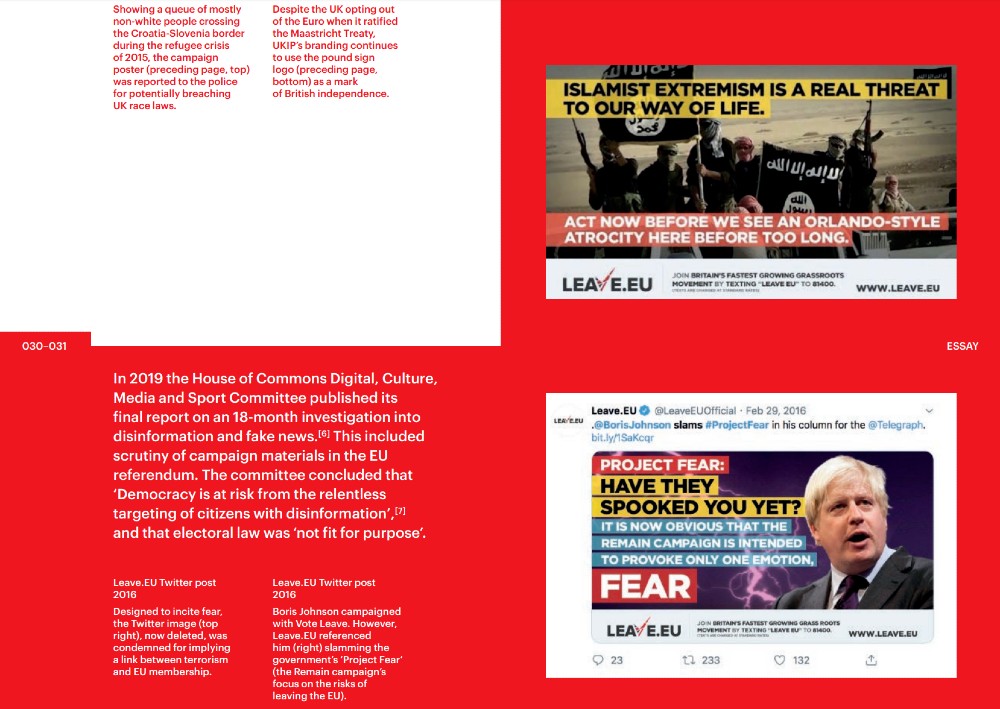
‘I have been a Leaver for at least 25 years, because I attribute to the EU’s lack of democracy and its drive to federalism the resurgence of extreme nationalism, antisemitism and breaches of human rights across Europe.’ (Baroness Ruth Deech, academic, lawyer, bioethicist, politician, Oxford)
Britain Stronger In Europe campaign, 2016. Designed by branding experts North, the official Remain campaign identity played on the word IN and referenced the UK flag. It was accomplished, but failed to connect emotionally with voters. Image: Ed Everett
‘Cutting ourselves off seemed very short sighted… On top of a decade of cuts in public services, a small group of wealthy individuals from the Leave campaign are cognitively dissonant when it comes to Britain’s financial future – still insisting that the rest of the world will want us to trade with them and welcome us with open arms.’ (Darren Bray, black cab driver, London)
‘Get ready for Brexit’ government campaign, 2019. Created by the agency Engine, the campaign reinforced Johnson’s key message to ‘get Brexit done’. Image: GOV.UK
‘I went out on the trawlers with my dad at 13. I loved fishing. I still love it… but people are basically skint here. I think that if someone is struggling, then someone, somewhere else, is benefiting as a result… I voted Leave and all my family did too. Our vote was a protest against the government.’ (Darren Kenyon, inshore fisherman, Grimsby)
‘Sorry, we tried to deliver your Brexit’ spoof Royal Mail card, 2019 (Image: copyright 2019 BLACK SCORE)
‘The EU is a fantastic concept that has brought so many positives to Wales, particularly via funding and grants… Brexiteers aren’t looking at the wider picture. Not all of us live in thriving cities. I don’t believe ‘our’ politicians will follow through and deliver the goods. They’re shit – and have been for 20 years.’ (Ioan Gwynedd, supermarket manager, Bangor)
Vote Leave bus, 2016. A key part of the campaign, the bright red bus was emblazoned with bold white lettering and carried the familiar NHS logo to support its claim that leaving the EU would release funds for healthcare. (Image copyright Greenpeace)
‘I have a Spanish background so many are surprised that I voted Leave… European funds for regional development have failed to improve the south’s impoverished labour market and, when things have gone badly, as in Greece, there has been a brutal lack of solidarity. The EU has a privatisation and market-led economic agenda that has failed millions of working-class Europeans.’ (Michael Arrastia, software developer, Bristol)
Government leaflet, 2016. All UK households received this government leaflet setting out the case for Remain. The design is visually neutral but was off-putting to all but genuinely engaged readers. (Image: GOV.UK)
‘In 2016, though the EU was far from perfect, I liked the idea of a multicultural world… This focus perhaps sounds idealistic, perhaps unrealistic, but I believe that we should seek justice and acceptance for all people from all corners of the world.’ (Denise Wilson, retired teacher, psychotherapist, Sunderland)
It is important to note that we began this project in early 2019, with contributions submitted before the first Brexit deadline of 29 March 2019. The book is therefore a snapshot of a very particular time in British history. Yet despite all that has happened since, our contributors stood by their answers when they checked their proofs in the autumn of 2019.
The Other Side: An Emotional Map of Brexit Britain is edited by Lucienne Roberts and Rebecca Wright and available from GraphicDesign&.
This post represents the views of the author and not those of the Brexit blog, nor LSE.


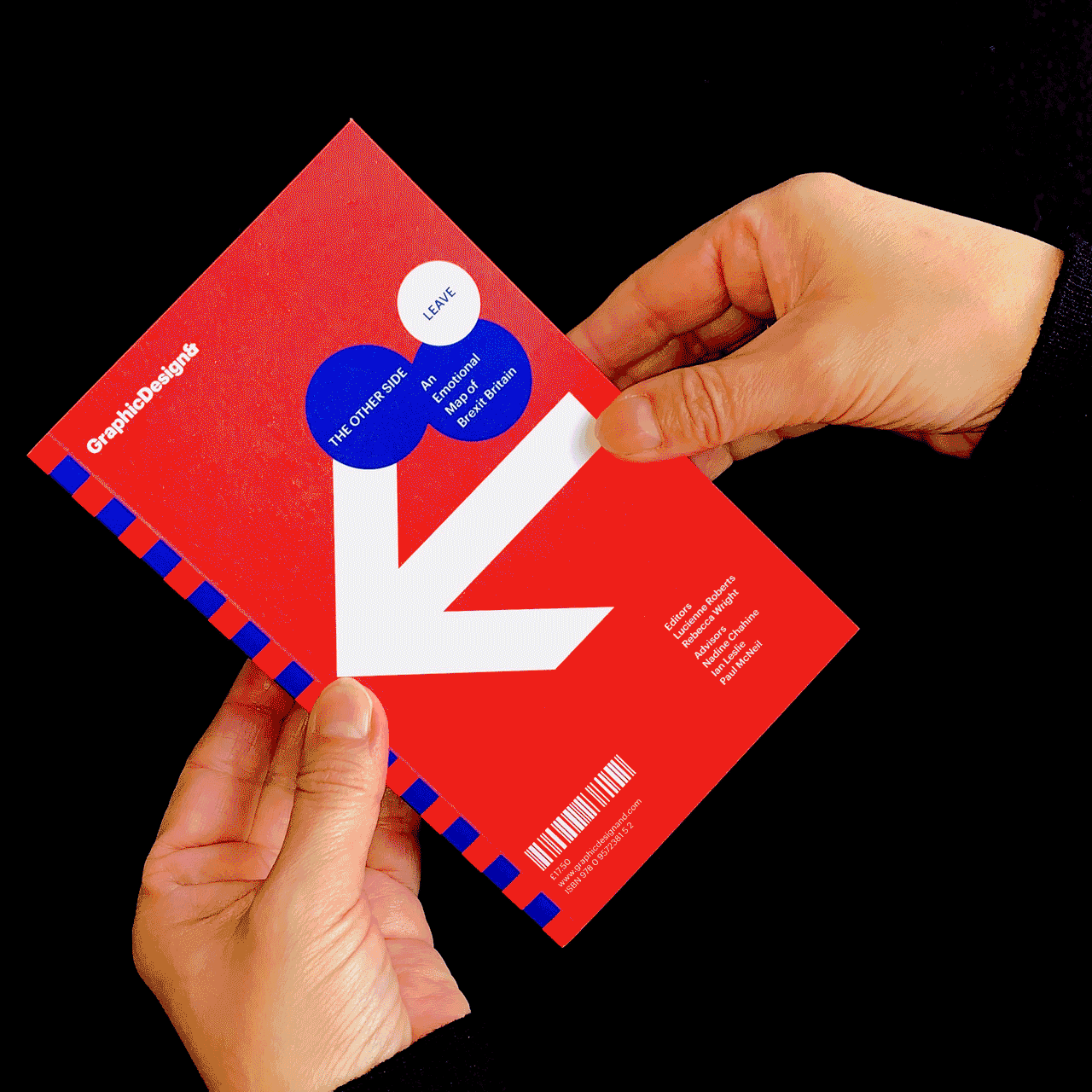

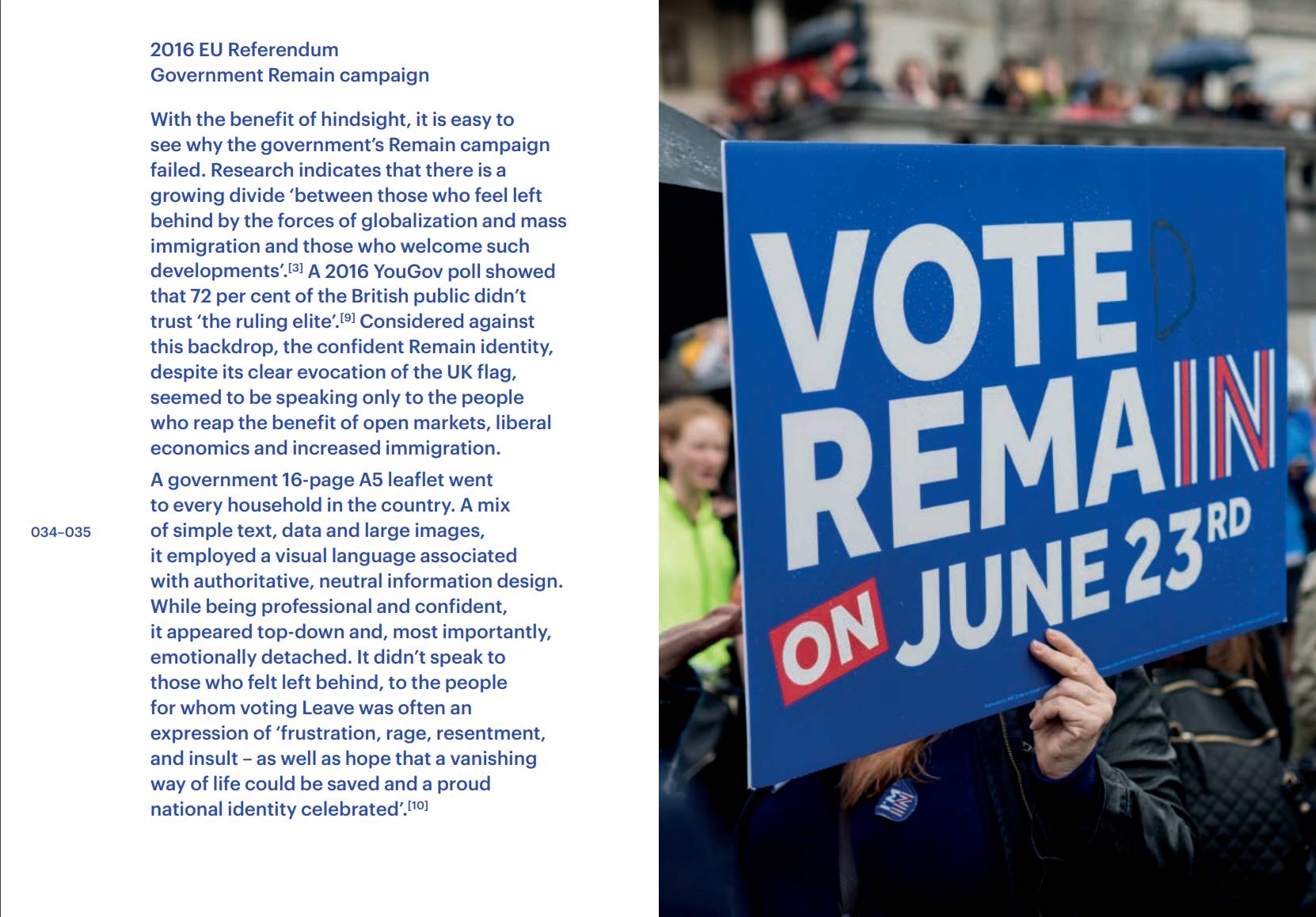
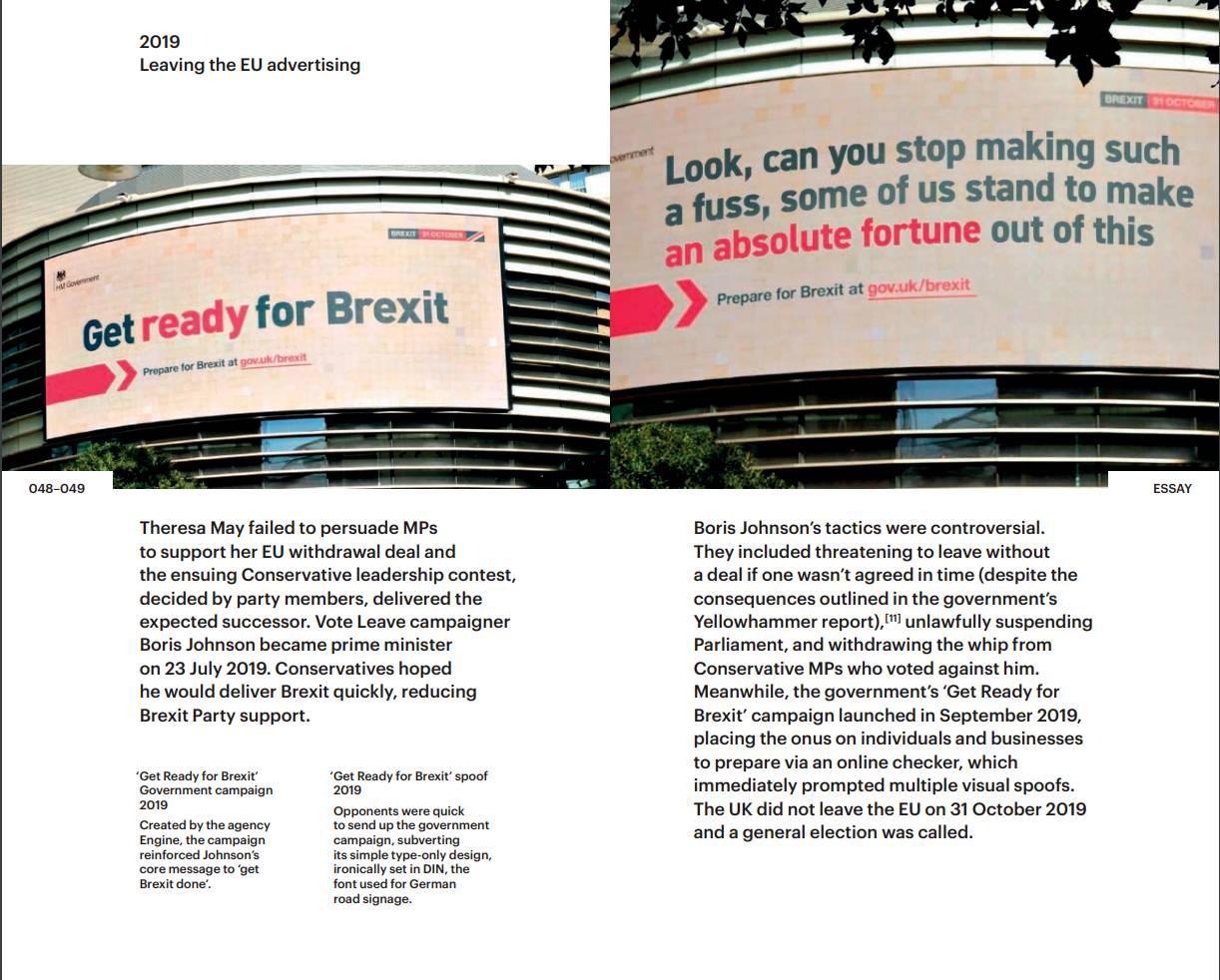
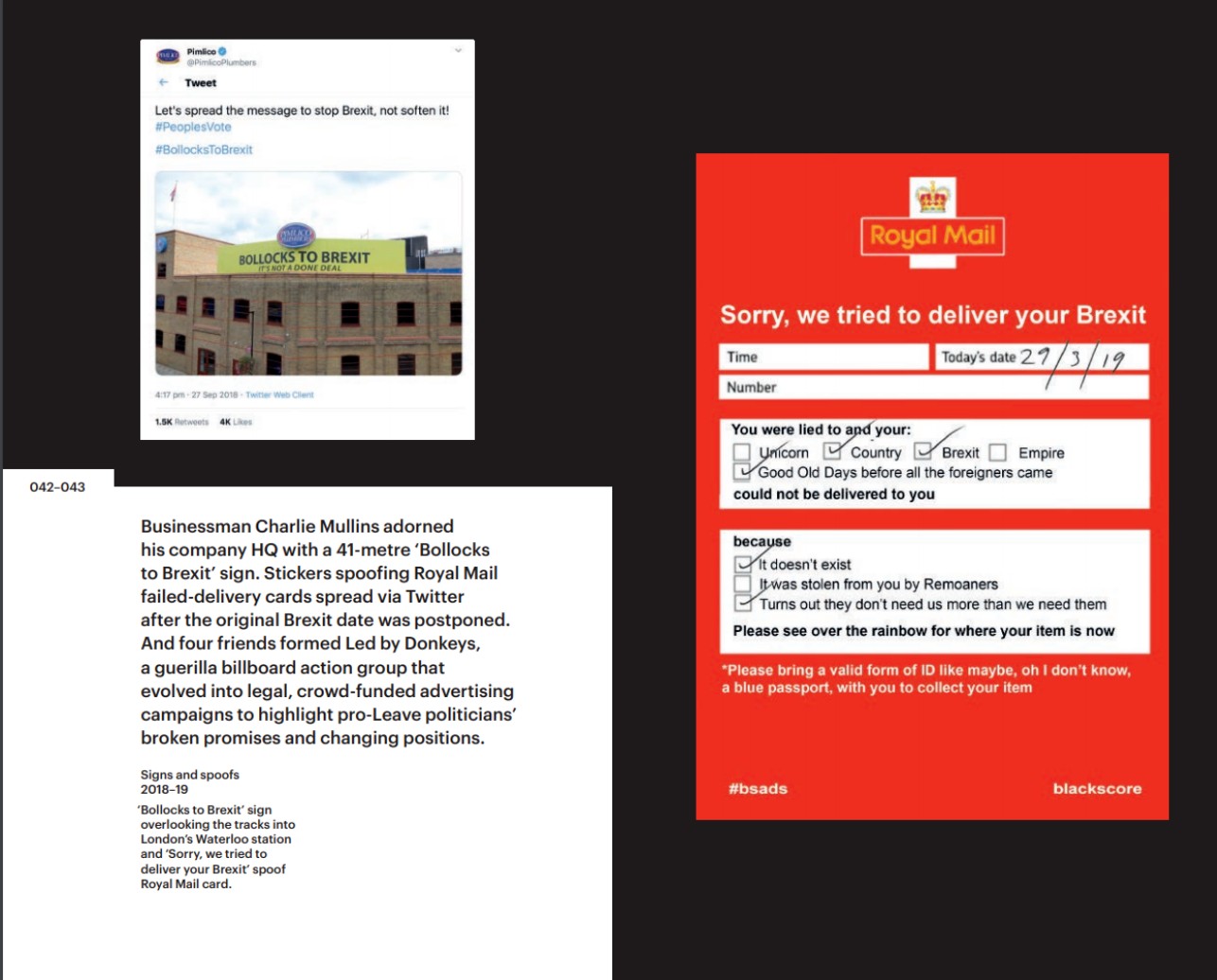
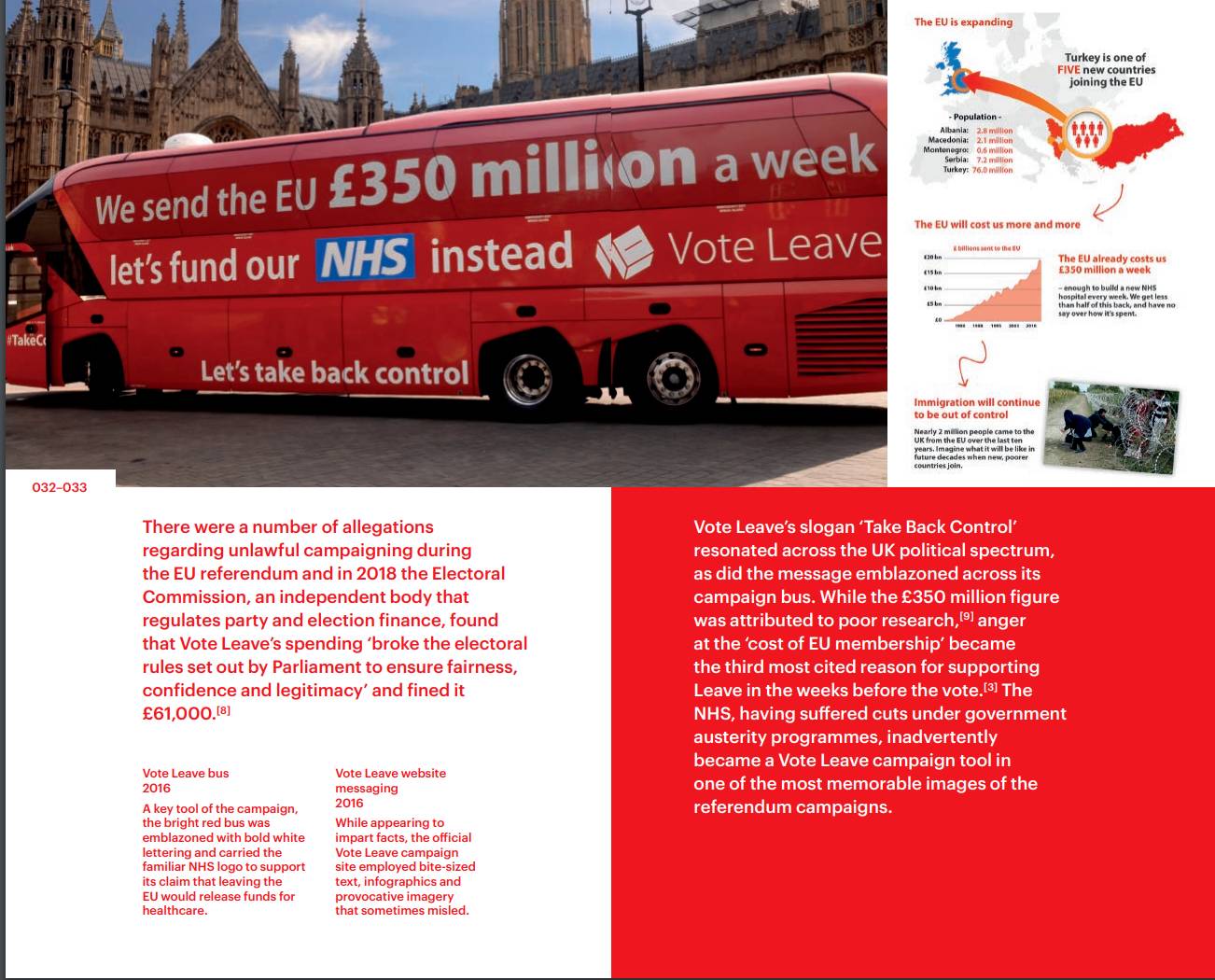
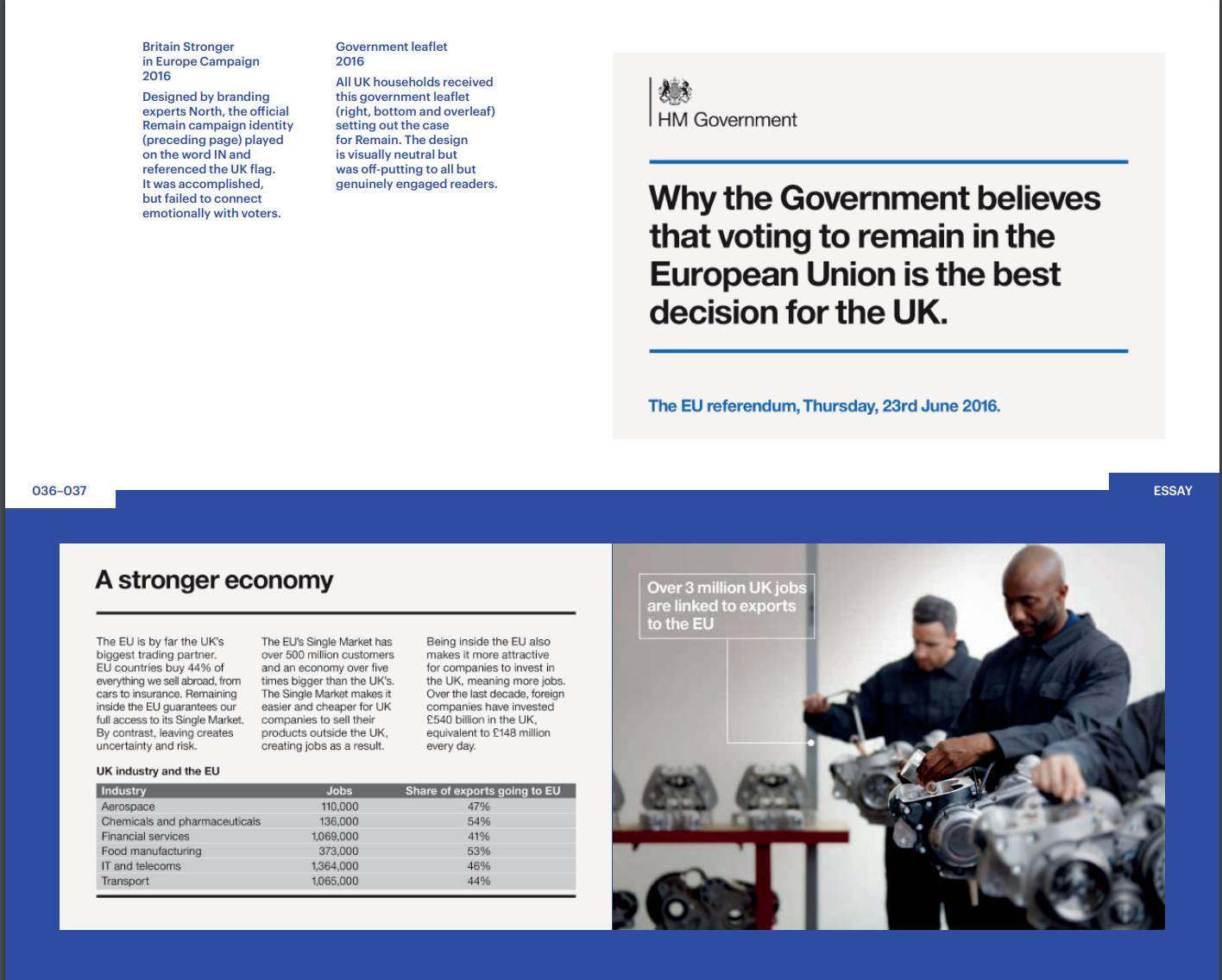




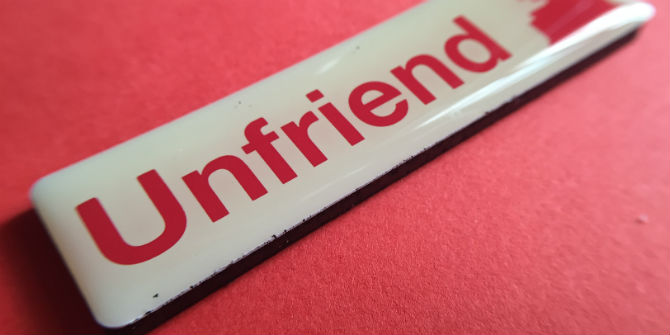
If the Welsh and Scots are willing to put up with the English it is no great hardship for the latter to put up with their more tolerant EU neighbours.
Interesting, and admirable. We sure live in interesting times, as I have remarked many times before. Just then, my mobile phone made the weirdest noise, which I had only ever heard once before, as an exercise, a false alarum, so to speak. This time, for real, an alarm courtesy the New Zealand government, with a message. We sure live in a different era than before the Brexit referendum. In fact, we have lived in this new era, this brave new world, for longer than most of us in the West have been willing to admit, even just to themselves. Possibly, many of us In the West have been unaware. Even now, there is ample evidence that many people are oblivious or knowing but in complete, sometimes semi-hysterical, denial.
There is at heart always duality, energies/forces which are engaged in opposition. The Brexit referendum has exposed such oppositional energies. To seek to reconcile these opposing forces may be much like tilting at windmills, unless one is able to get to know and understand what drives the formation and division of seemingly irreconcilable positions. Generally, people do what they must, including academic, scholarly and intellectual pursuits. Let’s say we are serious about getting Remainers and Leavers to agree. They have not yet entered a common arena where they could agree to disagree and proceed from there to find common ground in a political sense. There is a fundamental problem here, as noted in the evidence provided. A year after the exit in law, constitutionally speaking, the positions taken have not changed. And lo, already we have a deep and possibly unbridgeable disagreement here. Because, many would claim that the Brexit exit was legally postponed.
From time to time a society meets with existential crises. Europe has been heading for one ever since the EU project was conceived and set upon a widening and deepening basis within the entire social, political and financial-economic framework that was, roughly speaking, Western European, now the EU at large, society. Britain was always on the margin of Europe, but not separate from it. Hence, a belated joining the EC/EU and a belated growing of dissent with the direction taken. Brexit is an inevitable result of the inexorable developments in continental Europe by way of the EU European federalisation project.
To know where you are at, it is essential to take cognisance of the facts. By and large, Leavers are ahead in this, whereas Remainers who have not accepted the referendum result may, and it appears to be are, not au fait with developments in Europe, and, by implication, the rest of the West. Namely, there has occurred, over a period of decades, an irreconcilable split in the dominant political culture in the West, but notably in Western Europe. Politics within any arena, whether it be local, national or international, presupposes an agreement by the contending parties to agree on a field with boundaries within which disagreements are contested and either resolved or left to fester. Western democracies, since the Treaty of Westfalia, have more or less, with a few serious upsets along the way, kept to the notion that these fields of political contending would be the nation-state or, in some case, nations-state. The EU project has managed to subvert and overturn this principle.
In many ways, the EU project has undermined the very basis of the limitations of the field of political contestation. This not on its own accord, which would be problematic enough, but in sympathy with or at the behest of the powers which have been instrumental in the all-out push for a one world political total order. This means that every aspect of human society would be ruled from on high. International treaties and busybody institutions, globalisation and the internationally calibrated propaganda and force-feeding of the mainstream narrative are all part of that. As a consequence, the basis on which political differences were contested was gravely undermined. Knowingly or otherwise, people in EU member states, and in particular in the UK, had taken sides. One side wants to hold on to the traditional field of political contestation, the other side rejects that and has chosen for the Supranational option, effectively choosing a one world order- the new field of political contests. Remainers who have not accepted the verdict of the Brexit referendum are in favour of the EU as the new field of political contests. These people, along with the internationale Leftists and assorted “progressives” have torn up the rule book, for themselves. Leavers and other democrats are still in the traditional field of political contestation, while the rest just mentioned have placed themselves outside of it. And never they shall meet, except in an existential struggle which, hopefully, will be largely an inner struggle.
Nice post.